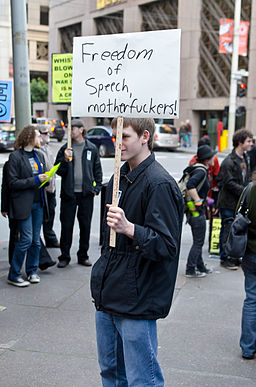 Damion Reinhardt (Background Probability) wrote an interesting post on the topic of free speech and how there are at least two vastly different ways of understanding its importance. I found his post to be relevant because I've been thinking about free speech in the context of atheists criticizing religious belief in general - and Islam in particular - for some time now.
Damion Reinhardt (Background Probability) wrote an interesting post on the topic of free speech and how there are at least two vastly different ways of understanding its importance. I found his post to be relevant because I've been thinking about free speech in the context of atheists criticizing religious belief in general - and Islam in particular - for some time now.What Damion refers to as "the narrow view" and describes as the one favored by social activists is the perspective that, "...only the government is capable of interference with free speech." I can relate to this perspective because, sadly, it is one I used to hold. That is, I used to think that the only real threat to the free expression of ideas was that which resulted from the application of state power. As long as the government was not criminalizing speech, I figured we had nothing to worry about. I now believe I was wrong and embrace a much broader view of free speech.
As Damion points out, there are some advantages to adopting such a narrow view of free speech. Chief among them, it becomes permissible to try to shut down any speech one does not like, and it is quite simple to stifle criticism of one's ideas. Whether you are a Muslim who doesn't want anyone to criticize Muhammad or a Catholic who doesn't want people to laugh at you when you rub ashes on your face, just shut them down. Accuse them of bigotry or intolerance, and bring every social pressure you can muster (e.g., public shaming, online harassment, boycotts, complaints to employers) to bear upon them until they agree to remain silent. By destroying their reputation, you'll be teaching them a valuable lesson. Best of all, you'll be preventing others from daring to criticize whatever you consider "holy" as well.
What Damion labels "the broad view" of free speech centers on the idea that we should all be free to contribute to "an open marketplace of ideas" without interference from governments or other citizens. But can private citizens without state power behind them really restrict someone's right to free speech? Absolutely. If protestors were to successfully shut down a scheduled speech or shout down someone attempting to speak so that they are unable to do so, they are restricting the speaker's right to free speech. When social justice warriors manage to get someone fired for saying something that hurt their feelings, this has an undeniably chilling effect.
The common refrain one hears from those who support this broad view of free speech is that the antidote to bad ideas, including what some describe as "hate speech," is more speech rather than less. As Damion explains,
The argument, in a nutshell, runs something like this: If we clear away the various barriers put up against the free exchange of ideas—whether by government or non-government actors—then our ideas will be forced to compete on merit. In a truly free marketplace of ideas, the good will drive out the bad over the long run. There is therefore no need to resort to shutting down speech, whether by force or by other means.Right. Not only is there no need to attempt to shut down speech; attempting to do so is often counterproductive. It certainly runs counter to classical liberalism and freethought.
So how did I manage to move from the narrow view to the broad view? It was a slow and uncertain process with lots of false starts and ambivalence. It began with my observing the damage done by social justice warriors, which led me to learn more about freethought, classical liberalism, and Enlightenment values. The more I learned, the more I realized that private citizens could do plenty of damage to free speech without state power.
Admittedly, when it comes to free speech, there are some things I am still trying to figure out. What I am becoming increasingly clear about is that we need to be extremely cautious about the use of social pressures to restrict speech we do not like. Freedom is far more important than hurt feelings.